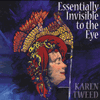
KAREN TWEED Essentially Invisible To The Eye
May Monday Adventures MMA6327002
A mad mix of accordion styles: Latin, Musette, Irish, English, Scandinavian and modern jazz - and that's just the first track on this long overdue solo album from Gloucester's answer to Phil Cunningham. In fairness, there are only five tracks on the disc, averaging eight minutes each, so there's room to pack a few different ideas into each one. According to the notes, Karen has selected musical memories and is melding them into something like an autobiography here. "Each melody was chosen with specific people, places, happenings and memories in my mind", she says, which partly explains why each track carries a person's name. It may also account for some surprise inclusions - in particular Edelweiss and Que Sera Sera - as we have all lived through the influences of Julie Andrews and terrible pop songs.
Karen Tweed's experience of accordion music stretches wider than most. From the Irish tradition where she made a name for herself, to the English and Scandinavian sounds of The Kathryn Tickell Band, Swåp, and more recent collaborations with Finnish maestro Timo Alakotila, Karen has garnered music throughout northern Europe. Her interest in Latin accordion - Piazzola tangos and the like - has grown over the years, and she also gleefully ignores boundaries and taboos, leading to a mix of styles in her current Number 1 Ladies' Accordion Orchestra which is beyond categories. About the only thing missing from this solo recording is Cajun music - so watch this space!
Robins by Jon Swayne, a virtuosic little waltz, sits alongside French and Spanish street music. Gráda's slip jig The Striking Clock, followed by a couple of great traditional jigs, flows perfectly into two Tweed originals. Raudimic by French hurdy-gurdy genius Gilles Chabernat follows a traditional Irish polka and precedes the modern Scottish accordion challenge Washington Square Park. There's more, from people and places unfamiliar to me, but it all fits beautifully around and through Karen's own music. I can't resist highlighting Pamela Rose Grant, a stupendous slow strathspey by Alasdair Fraser, which Karen plays superbly.
Tweed compositions account for about a third of Essentially. They range from the sweet and lyrical Ffion's Waltz to the gutsy Miles Bourrée. Her music is descriptive, engaging, not as wild or as jarring as some, but still with a range of tones which can express all the emotion of a full and varied life. No Better Friends and Our Peter mark Karen's tendency to write cracking tunes for her nearest and dearest. Mattie And Karine's is another one to be proud of. The entire album, start to finish, is on unassisted solo piano accordion, a 72-bass Pigini: those who have seen Ms Tweed live, manicured and behatted as is fitting for a lady of her stature, will appreciate what a wall of sound, and at times what a joyous unholy racket, can come from this particular solo piano accordion. There are no excesses here, nothing to frighten the horses, but there is a great deal of warmth and feeling, and a musical life shared for a brief period. You can sample this exceptional recording at www.karentweed.com, but for the full effect you really need the whole CD, box and all.
Alex Monaghan
| Buy
this CD online from The Listening Post The Listening Post is the CD mailorder service of The Living Tradition magazine. This album was reviewed in Issue 91 of The Living Tradition magazine. |

